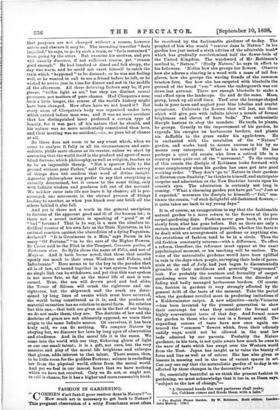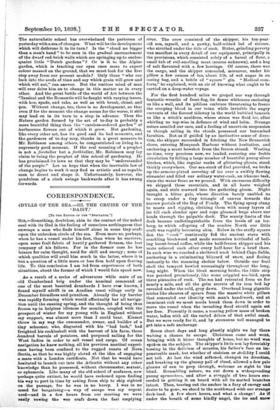FASHION IN GARDENING.
4' ri OMBIEN d'art faut-il pour rentrer dans la Nature ?"— k../ How much art is necessary to get back to Nature P This pregnant observation of a witty Frenchman must often
be re-echoed by the fashionable gardener of to-day. The prophet of him who would " rentrer dans la Nature" in his garden has jest issued a sixth edition of the admirable book* which has gradually revolutionised half the flower-beds of the United Kingdom. The watchword of Mr. Robinson's method is, "Nature." 'Study Nature,' he says in effect to his followers. Notice how she groups her flowers. Observe how she adorns a clearing in a wood with a mass of tall fox- gloves, how she groups the waving fronds of the common bracken fern. See how she has carpeted with bluebells the ground of the broad "rue" where the undergrowth was cut down last autumn. There are enough bluebells to make a real effect upon the landscape. Go and do the same. Mass, group, break up all stiff lines. Turf over the lozenge-shaped beds in your lawn and neglect your blue lobelias and scarlet geraniums. Cultivate the flowers that will last, not those which will give you with infinite labour a month of formal brightness and eleven of bare beds.' The enthusiastic disciple hastens to obey the mandate. He turfs, he plants, he groups. Greatly to the improvement of his garden, he expends his energies on herbaceous borders, and plants his daffodils in the grass under his apple-trees. He is enchanted with the revelation of the "Nature" garden, and works hard to secure success in his by no means easy enterprise. What is his reward ? He has perhaps a quiet old cousin who lives a retired life in a country town quite out of the "movement." To the coming of this cousin the disciple of Robinson looks forward with some complacency when his garden has once got into good working order. "They don't 'go to' Nature in their gardens at Slowton-cum-Snailsby," he thinks to himself, and anticipates surprise and admiration as the New Doctrine bursts upon his cousin's eyes. The admiration is certainly not long in coming. "What a charming garden you have got "—(" Just as I expected," murmurs the disciple to himself)—" fall," con- tinues the cousin, "of such delightful old-fashioned flowers,— it quite takes me back to my young days."
It is, of course, an exaggeration to say that the fashionable natural garden is a mere return to the flowers of the pre. carpet-gardening days. Fashion never goes back, it evolves slowly from what has gone before. But as there are only a certain number of combinations possible, whether the facts to be dealt with are arrangements of gardens or anything else, the evolutions of fashion tend to be in a circle. Thus the old fashion constantly returns—with a difference. To effect a reform, therefore, the reformer must appear at the exact psychological moment, or his teaching will be useless. The voice of the naturalistic gardener would have been uplifted in vain in the days when people, surveying their beds of peren- nials at the end of July, had just begun to discontentedly grumble at their untidiness and generally " nngroomed" look. For probably the neatness and formality of carpet. gardening were the direct reaction from the disorder of fading and badly managed herbaceous borders. Of course, too, fashion in gardens is very strongly affected by the general drift of the taste of the moment. Take the period when the gardener revelled most in producing imitations of a Kidderminster carpet. A new adjective—early-Victorian —has been invented by the present generation to show their contempt for what they consider the formal and highly conventional taste of that day. And formal comes the garden to those who are cast in a formal mould. The expanding canons of taste have now once again em. braced the "common" flowers which, from their odiously untidy ways, could not be allowed in the neat low beds admired by our parents. Probably the Nature gardener, in his turn, is not quite aware how much he owes to the wave of taste which has swept over the Western world from the East. Japan has taught us to value the beauty of form and line as well as of colour. She has also given us lessons in massing and in the use of vacant spaces in art. Can any one say that the naturalistic garden of to-day is un• affected by these changes in the decorative arts P
So, essentially beautiful as we think the present fashion in gardening, we must acknowledge that it too is, as Ibsen says, "subject to the law of change.,"— "A thousand hands the vast parterres shall make,
Lo, Cobham comes and floods them with a lake."
• The English Plower Gardtm, By W. Robinson. Sixth edition. London: John Murray. [15o.) The naturalistic school has overwhelmed the parterres of -yesterday with a sea of changes. What will be the development which will dethrone it in its turn ? Is the "cloud no bigger than a man's hand" to be seen in the gradual encroachment of the dwarf red-brick walls which are springing up to enclose quaint little "Dutch gardens "? Or is it to the Alpine garden, which is teaching our eyes once more to expect colour massed on the ground, that we must look for the first step away from our present models ? Only those "who can dook into the seeds of time and say which grain will grow and -which will not," can answer. But the restless mind of man twill ever drive him on to change in this matter as in every other. And the great battle of the world of Art between the 431assical and the Romantic will be fought with varying issues, with hoe, spade, and rake, as well as with brush, chisel, and -pen. Without change, too, there is no development, so that even if for the moment the change seems for the worse, it still may lead on in its turn to a step in advance. Thus the Nature garden formed by the art of to-day is probably a more beautiful thing than the "careless-ordered garden" of .herbaceous flowers out of which it grew. But gardening, like every other art, has its good and its bad moments, and the gardeners of to-day may, thanks in a great measure to Mr. Robinson among others, be congratulated on living in a supremely good moment. If the real meaning of a prophet is not a foreteller but a forthteller, Mr. Robinson may lay -claim to being the prophet of this school of gardening. He -has proclaimed its laws so that they may be " understanded of the people." Let us hope that when the inevitable law of change begins to work it may find as artistic and as capable men to direct and shape it. Unfortunately, however, the pendulum of a clock swings backwards after it has swung forwards.



































 Previous page
Previous page